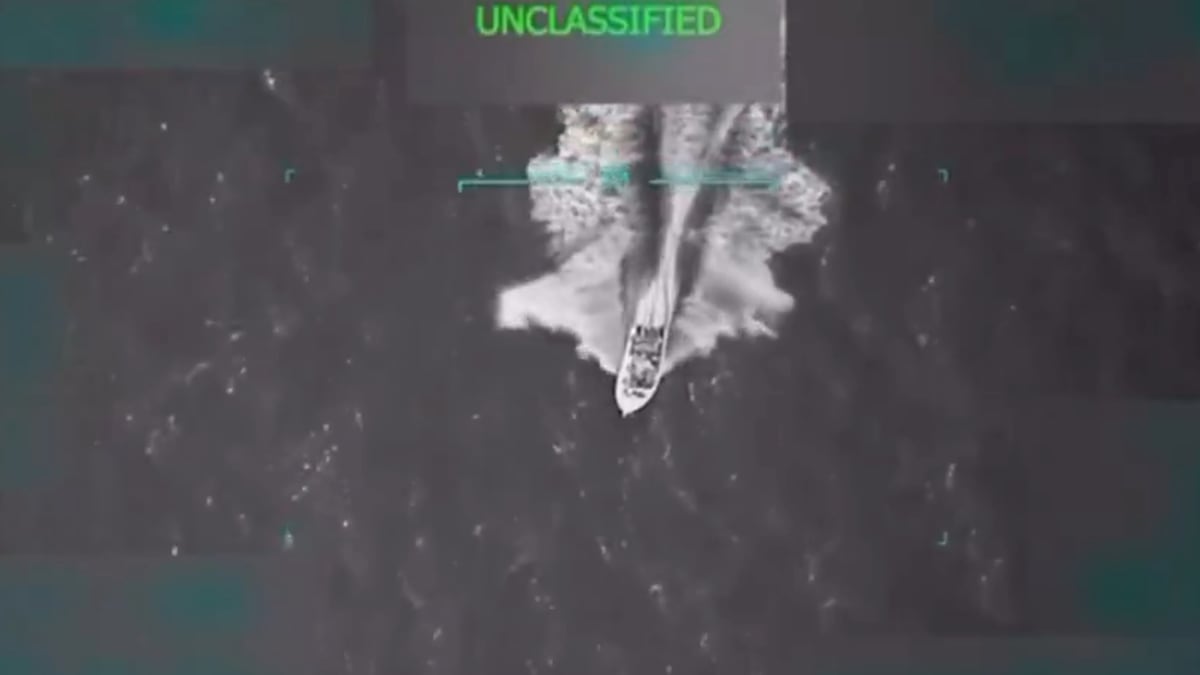Hostility between the United States and Venezuela has reached an unprecedented level during Donald Trump’s presidential cycles. After six years of wrangling — of understanding and decompressing the Venezuelan political conflict and its international implications — tensions have escalated with the deployment of warships in the Caribbean and the deadly attack on a drug-trafficking boat — which killed all 11 crew members — allegedly originating from Venezuela.
Gone is the cryptic yet intimidating line in the yellow notebook of former White House national security adviser John Bolton, bearing the message “5,000 troops to Colombia,” which the controversial official revealed at a press conference in January 2019. It was a bellicose spark amid the crisis unleashed by opposition leader Juan Guaidó proclaiming himself interim president to force Nicolás Maduro from power. Now, eight warships, 4,000 U.S. military personnel, and a nuclear submarine are deployed along Venezuela’s northern coast. The attack on the vessel marks a milestone in the strained relations between the two countries, as well as in U.S. foreign policy and its capabilities to impose its agenda.
At the end of Trump’s first administration, the conflict between the countries began to escalate with the suspension of operations of the United States Embassy in Caracas and the withdrawal of all diplomatic personnel. It was also the year in which the first sanctions were imposed, specifically aimed at stifling Venezuela’s oil economy by penalizing third parties trading in the South American country’s crude. The U.S. narrative of pressure on Maduro, who had been reelected a year earlier in elections considered fraudulent, was based on the premise that “all options are on the table,” an ambiguous phrase with which the Republican magnate attempted to undermine Chavismo during the current geopolitical standoff, trying to make it seem that Maduro would seize power at any cost.
Over the past six years, Venezuela has repeatedly denounced alleged conspiracies from Washington to force a change of government. During 2019 and 2020, Chavismo dismantled operations that heightened diplomatic tensions and placed the Maduro government on a permanent state of alert. This has allowed it to unleash a repressive policy against its critics, resulting in imprisonment, exile, and the murder of protesters, as well as reinforcing the anti-imperialist rhetoric that underpins Chavismo.
The most famous of these failed skirmishes, known as Operation Gedeón, was led by a group of Venezuelan dissident soldiers stationed in Colombia and three members of a private security force made up of former U.S. Green Berets. They attempted to infiltrate Venezuela through the central coast to overthrow the Maduro government. Although the United States and Colombia — then governed by Iván Duque — denied involvement, Venezuela nonetheless accused them and the incident has repeatedly been used to reiterate the Chavistas’ claim of an international conspiracy against them.
The Biden administration was a turning point for understanding and détente. Sanctions were replaced with oil licenses, and Chavismo promised to make concessions to the opposition, which were not fulfilled. This restructuring of relations between the United States and Venezuela foundered after the 2024 presidential elections, after which Maduro again remained in power amid allegations of fraud by the opposition, which published the voting records that declared Edmundo González Urrutia the winner.
Trump’s second term, however, has been more direct. In seven months, he has rapidly evolved his pressure mechanisms. From the meeting with special envoy Richard Grennel — which facilitated agreements such as the exchange of American prisoners for Venezuelans deported from the United States — to the suspension of the license of the American oil company Chevron, Maduro has now become a drug trafficker in the eyes of the U.S.
Washington accuses him of being the leader of the so-called Cartel of the Suns, an alleged organization operated by Venezuelan military forces to move drugs into the United States. He has also been accused of heading Tren de Aragua, a transnational criminal gang of Venezuelan origin that Trump blames for all of his country’s ills. A few weeks ago, the reward for Maduro’s capture was raised from $25 million to $50 million, and he has been named one of the targets of the U.S. anti-drug war in the Caribbean, an accusation that Chavismo has denied and that the opposition, united around María Corina Machado, has made a banner.
The incidents of maritime tension with Venezuela have centered on the interception of foreign oil tankers in disputed waters east of the country, where Guyana has begun its oil era. In the territorial dispute over the Essequibo and the delimitation of the Atlantic coastline between Caracas and Georgetown, the United States has intervened tangentially, supporting Guyana’s position of defending its possession of the territory. Venezuela has vigorously defended itself diplomatically and with the presence of its Navy.
But in the current scenario, following the deadly attack on a drug-running boat confirmed by the United States, Venezuela has cautiously heeded Trump’s warning. Initially, Caracas dismissed the attack, claiming that the video released of a boat exploding with its crew inside was created using artificial intelligence. But for the past week, Chavismo has issued emergency calls to the Latin American and Caribbean Economic Community (CELAC) and the United Nations demanding the withdrawal of all U.S. military equipment from the Caribbean, which they consider “the greatest regional threat” recorded in the last century.
Sign up for our weekly newsletter to get more English-language news coverage from EL PAÍS USA Edition

